- Home
- Patricia MacLachlan
Baby Page 4
Baby Read online
Page 4
She remembered the color red: red flowers that bloomed in winter, cold red sunsets, and especially a tiny teardrop of red that glowed like fire in the light. She now wore it around her neck, but when she thought of it she could remember the feel of it in her hand, how her fingers curled around it. Sometimes she opened her hand, expecting to see it there shining in the pocket of her palm.
Red had always made her happy.
chapter 9
In the night I woke to hear the rain turn to ice, the sound like rocks against the roof and windows. When I slept again I dreamed. I was cold in my dream, so cold that goose bumps rose on my arms, and when I breathed out my breath hung in a cloud of ice. In my dream the fields were ice covered, the sea was frozen, the waves spiking in gleaming glass waves. Far off Sophie was walking away from the island in her red boots.
“Baby!” I called to her, but she didn’t turn around. She walked across the harbor, around the fishing boats frozen in place.
“Come back, Baby!” I screamed.
In my dream Byrd came to stand next to me.
“Call her by her name,” Byrd said sadly. “Call her Sophie.”
Tears sat frozen on her cheeks like diamonds. I stared at her, but when I turned back it was too late. Sophie had walked past the breakwater and was gone.
“La.”
Fingers poked at my eyes.
“La.”
I woke in the darkened room, the dream slipping away. Sophie sat on my bed in her blue woolly pajamas with the feet. Her red boots were next to my pillow.
“La.”
Sophie’s cold fingers touched the tears on my cheeks.
I sat up in bed. The air was cold in my bedroom, though early light shone in along the edges of the window shades. I leaned over and pulled up the shade. Ice sat thick on the inside of the windows. Outside there was ice everywhere, the telephone lines and the roads covered, the trees bending over with the weight. The fields were still and shining, like my dream.
I pulled Sophie under the covers with me, tucking them around us.
“Sophie!” Mama called down the hallway.
“Sophie!” called Sophie, imitating her.
“There you are,” said Mama in the doorway. “The electricity is off, Larkin. Papa’s making a fire. You’d better stay in bed until we get some heat in the living room.”
Mama came over close to the bed and looked down at us. Behind her Byrd appeared, dressed in her velvet robe, heavy socks, earrings, and a hat. I smiled.
“Don’t mention how I look,” warned Byrd.
“Brrr,” said Sophie, reaching out a hand to her.
“She said Byrd!” said Mama, smiling at Byrd. “Sophie’s beginning to say more than her name. At last!”
“Lily! The fire’s ready.” Papa’s voice came from downstairs.
Mama turned and went down the hallway, pulling her sweater around her.
Byrd sat on my bed and took Sophie’s hand.
“Hand,” said Sophie.
“No school,” Byrd said to me.
I sighed.
“No poetry,” I said.
After a moment I looked at Byrd.
“What do you know about poetry?” I asked Byrd.
Byrd smiled and shivered. I opened the covers for her and she got in, Sophie between us. Sophie reached over and played with the ruby that hung on the gold chain around Byrd’s neck.
“Poetry is a way of taking life by the throat,” said Byrd. “That’s what Robert Frost said.”
“Ms. Minifred says that poetry shows us the world,” I said.
Byrd smiled.
“Words are uppermost in Ms. Minifred’s life,” she said.
“Do you think words have answers?” I asked.
Byrd took off her necklace and handed it to Sophie.
“La,” said Sophie happily.
She looked at it closely, turning it over and over in her hand.
“Do you?” I asked Byrd. “Think words have answers?”
“It depends on your questions,” said Byrd. “But”—she turned her head to look at me over Sophie—“you should know that there are some things for which there are no answers, no matter how beautiful the words may be.”
I stared at her.
“Sometimes poetry—words—give us a small, lovely look at ourselves,” said Byrd. “And sometimes that is enough.”
There was silence.
“Sometimes,” Byrd added in a soft voice.
“I had a dream,” I said. “You were in it.”
“A good dream?”
“No,” I said. “Sophie walked away across the icy sea and never once looked back at us.”
Byrd was quiet, and we watched Sophie open and close her small hand around the ruby. After a moment Byrd sighed.
“That’s the way it will be, Larkin,” she said.
“In the dream I called Sophie Baby. You told me to call her by her name,” I said.
“Baby,” said Sophie, putting her hand on my lips.
“Baby,” I said, smiling at her.
We lay in silence, the three of us, as the sun rose and came in through the window and over us. Outside the island glistened.
“Why didn’t Mama and Papa name the baby?” I asked.
Byrd didn’t look surprised.
“Have you asked them?”
I shook my head.
“No,” said Byrd. “For now it is too new, too close to them to talk about. They are busy trying to protect each other.”
She turned and looked at me.
“You are wondering right now who is protecting you, aren’t you?” she asked.
I didn’t answer. Sophie came out from under the covers.
“I never saw the baby, Byrd,” I whispered. “Not once. And he doesn’t have a name.”
“I know.” Byrd whispered too. “But that is for your mama and papa to do. You will have to find your way. Your dream is like a poem, you know. It put in words what you think about but can’t say. Maybe that’s what poems do. Maybe this is what Ms. Minifred knows.”
I looked out the window for a moment, then I turned back to Byrd.
“Byrd?”
“Yes, dear.”
“Words are not uppermost in Ms. Minifred’s life anymore.”
“Is that so?”
“Ms. Minifred and Rebel are in love. She said ‘yep’ yesterday. Just like Rebel.”
At this Byrd raised her head off the pillow.
“She said ‘yep’?”
“Yep,” I said.
Byrd began to laugh, and I laughed too. Sophie peered at us, sitting back on her heels, smiling,
“Baby,” I said. “Hello, Baby.”
The smells of coffee and toast cooking in the fireplace came up from downstairs. And Byrd and I lay in bed with the sun coming in across the quilt, watching Sophie open and close her hand over the ruby.
Open, close. Open, close. Open, close.
chapter 10
Six days of ice.
Six days of no electricity.
No school because of water leaks.
And then, suddenly, without any warning, Sophie began to speak in sentences.
We’d spent hours in front of the fireplace. We’d eaten toast cooked over the fire and soup from the soup pot, when Sophie stood up and looked at us and said, “Food not good.”
Lalo loved it. He had come over to our house, wrapped like a mummy. He wore a wool hat, wool gloves, wool-lined boots, and a great wool scarf that Byrd said could have covered his mother’s grand piano. Mama laughed when she opened the door.
“Lalo? Are you in disguise?”
“My mother,” explained Lalo as he came in quickly. “She thinks germs cannot penetrate wool. Her words.”
Papa and Mama smiled. Lalo’s mother, Marvella, was efficient, running a forty-two-room inn. She was also beautiful and tall with long black hair, and she had come to the island fifteen years ago and fallen in love right off with Lalo’s father, who was then a fisherman. She had convinced
him to buy the inn.
“I don’t want you to fish. I’m scared of water. It makes me sick,” she had said.
“But this is an island, surrounded by water,” he’d told her.
I thought Marvella was perfect, and brave to be living in a place that scared her because she loved Lalo’s father. Even her name was perfect, Marvella Baldelli. She cooked dishes with wonderful names, too, like Provençale and scallopini and francese. She did, however, have “flawed ideas”— Lalo’s words—about electricity.
“Don’t stand near the sockets, sweet girl,” she told me when I visited, pulling me to the center of the room as if the electricity lurked in the sockets, waiting to hurl its arc forward. She always called me “sweet girl.”
Lalo dropped his wool in the hallway and went looking for Sophie.
“How’s your mother?” asked Mama, following him into the living room.
“At peace. There’s no electricity,” said Lalo.
Papa laughed.
Lalo saw Sophie. He smiled.
“So hello, Sophie.”
“So, Lalo,” said Sophie in a friendly, precise manner. “I want hot cereal.”
“So how did that happen?” Lalo asked Mama, amazed.
Mama shook her head.
“Children speak at different times, in different ways,” she said. “Larkin spoke early but never said her d’s.”
“She called me ‘Gaggy’ instead of ‘Daddy,’ ” said Papa.
“You hated it,” said Mama, smiling at him. “You were insulted.”
“Just think,” said Lalo, “she has all these words inside her, all the things she’s heard us say. She has sentences in her, sitting there, waiting to come out.”
“Like your mother’s electricity,” I said, making Papa smile.
We all looked at Sophie, as if she were a book about to be opened. Or written, maybe.
“So we could teach her all sorts of things,” said Lalo. He paused and looked at me. “Like poetry.”
I frowned.
“Words. Just words,” I said.
“Poetry?” Papa said softly. “Just words?” He looked at Mama.
“How do I love thee, let me count the ways …”
Mama looked up quickly. She smiled suddenly, a new look to her. Or an old look that I remembered.
“The fog comes in on little cat feet,” said Byrd to Sophie.
“Cat feet,” said Sophie. She pronounced the words carefully, like Ms. Minifred talking to Ozzie. We laughed. Sophie liked the sound of it, both the words and the laughter.
“Cat feet,” she repeated.
We laughed again, and Papa put his arm around Mama. Sophie pulled at Papa’s other hand. Mama and Papa got up, Mama lifting Sophie up too, Byrd’s ruby around her neck gleaming on her blue pajamas. They danced together, the three of them. Sophie’s arms went around them both as Lalo and Byrd and I watched, her small fat hands resting on their necks.
Lalo was quiet, watching.
They danced in the cold room to no music, though it seemed that music played.
“I like this,” said Lalo.
Byrd smiled.
I liked it, too, Mama’s face soft and smiling the way it used to be, Papa’s arms around her. I wanted it to last forever, Mama and Papa dancing in slow circles, Sophie making them smile again.
Lalo moved closer to Byrd and me.
“Maybe Sophie will stay,” he said after a moment, his voice soft.
I couldn’t speak. Byrd reached over and took my hand.
Sophie cupped her hand and waved to me. I waved back, and there was a sudden sharp pain in my throat as I thought about Papa’s warning not to love Sophie. It’s too late, Papa. Too late. I looked quickly at Byrd and saw her face, her eyes dark and bright at the same time. It was too late for all of us.
The lights flickered then, and went on, and I held my breath, afraid that the dance would end. But only Sophie saw. She pointed to the lamp in the corner and, as if she, too, didn’t want the moment to end, she whispered to us.
“There is light.”
She remembered voices. And words like whispers in her ear. Words like the soft wind, touching her.
Words.
chapter 11
The ice melted, the roads were cleared, and everything went back to the way it was. It was as if Mama and Papa hadn’t put their arms around each other, as if Papa hadn’t said words of poetry to her, as if Mama hadn’t been happy for that little while.
Papa went back to his silences and his work and his nighttime tap-dancing on the tiles for Sophie. Mama went back to her studio, painting for the afternoon hours when Sophie napped. I didn’t know what she was painting. There was no paint on her at the end of the day, no signs of what took her time, only a half smile when Papa asked her how it was going.
“Better,” she said with a tilt of her head. “Hard, but better.”
Byrd went back to her room behind the pocket doors, leaving them open wide enough for Sophie to walk in and out, and me, of course. Sophie dressed up in Byrd’s velvet hat with the diamond clip, and the wide-brimmed straw with the long red ribbon, and lace and beads. And always the red ruby. They read books, Sophie talking and turning the pages and pointing. Byrd’s voice was smooth, like the velvet of her hat.
“so much depends
upon
a red wheel
barrow
glazed with rain
water
beside the white
chickens.”
“That’s William Carlos Williams,” Byrd said to Sophie.
“She doesn’t understand,” I said.
“She doesn’t need to understand, dear,” said Byrd. “She likes the way the words sound.”
Sophie sat on the bed, Byrd’s jet beads around her neck, the black velvet hat on her head. She looked at Byrd and pointed to the page.
“Read,” she said. “Please.”
Byrd smiled at me.
“She’s not a baby anymore, you know. She’s growing up.”
“Not baby,” said Sophie.
There was a small sound behind me and I turned. Mama was in the doorway watching.
“Not baby,” Sophie said to Mama.
Mama looked at Sophie for a moment, as if studying her. Then she turned and was gone.
Sophie opened her hand and showed Byrd the ruby lying there.
Byrd looked at me. She sighed.
“Sophie should have that ruby,” she said. “Don’t you think, Larkin? Someday when I’m not here.”
Someday. I swallowed.
“Larkin?”
“Yes,” I said. “Yes.”
“That’s good,” said Byrd, settling back with her book. She had a satisfied look, as if something had been settled. But it wasn’t settled for me. I didn’t want to think about someday. Someday Sophie might go away. Someday Byrd might not be here.
I watched Sophie lean back against Byrd and listen to Byrd read poetry.
Sophie looked up at me as Byrd read.
“Who has seen the wind?
Neither you nor I;
But when the trees bow down their heads
The wind is passing by.”
“Wind,” whispered Sophie. She held out her hands and did rock, paper, scissors.
Byrd smiled as she read and held out her hand and did the same, her wrinkled hand with the long fingers and the wide rose-gold wedding ring. Rock, paper, scissors.
When we went back to school Rebel had fixed the roof, Portia had new shining braces on her teeth, and Ms. Minifred wore red lipstick and large hanging gold earrings in the shape of half moons.
We went to the library for the last period of the day, and Lalo’s mouth hung open when he saw Ms. Minifred.
“I thought she was old,” he whispered. “What happened?”
“Love happened,” I said. “She is old. She just doesn’t look old.”
“No,” said Lalo. “She looks wondrous.”
She did look wondrous.
“Get ready fo
r wondrous words,” I said.
“Good afternoon. Sit up, Lalo. Remember the blood flow. Today poetry,” said Ms. Minifred, smiling.
Words. Only words.
“I’m not going to lecture you about what poetry is, or how it’s written,” said Ms. Minifred. “Or even why it’s written. You can look that up in books. Instead, I’m going to tell you a story about me.”
Portia turned and smiled at Lalo and me; her braces and her glasses glittered. Ozzie didn’t snort. He sat up, interested.
“And when my story is finished, class is over,” said Ms. Minifred.
Rebel appeared from the hallway and leaned against the wall behind Ms. Minifred, his arms folded.
“When I was a girl, when I was twelve, my older brother William died,” said Ms. Minifred. “I loved him. He was good to me. He read me stories and poetry. He wanted to be a writer, and he once said to me that words were comforting. Words had power, he told me. There was no way I could accept his death.”
Ms. Minifred paused, and I felt a chill across my arms. No one moved. No one spoke. No one whispered. Rebel kept his eyes on Ms. Minifred.
“There was a funeral. There were flowers. Many people came, and many words were spoken. But their words didn’t help. Their words had no power. I was angry,” said Ms. Minifred. “I was angry with my brother for leaving me.” Ms. Minifred looked down at her hands. “I am still angry,” she said softly. “And then I found a poem among my brother’s books. He had marked this poem, so I knew it was important to him. When I read it I felt a strange and powerful comfort—not because it made me feel better, but because it said what I felt.”
Ms. Minifred opened a book, an old book with worn pages.
“The poem is by Edna St. Vincent Millay. You may not understand it. That’s all right. I understand it. And William understood it.”
No one coughed or sneezed. Everyone was still. I thought of Byrd saying Sophie didn’t have to understand the words.
“It is called ‘Dirge Without Music.’ ”
Ms. Minifred began to read.
“I am not resigned to the shutting away of loving hearts in the hard ground.
So it is and so it will be, for so it has been, time out of mind:

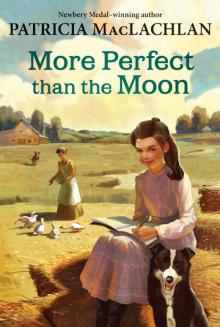 More Perfect Than the Moon
More Perfect Than the Moon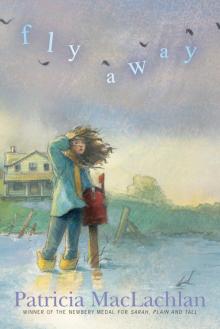 Fly Away
Fly Away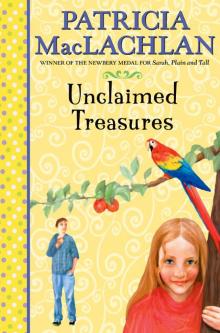 Unclaimed Treasures
Unclaimed Treasures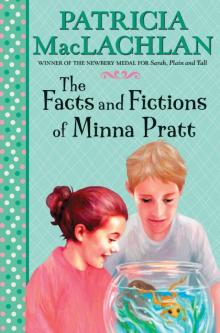 The Facts and Fictions of Minna Pratt
The Facts and Fictions of Minna Pratt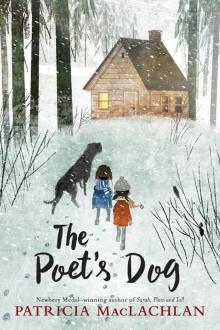 The Poet's Dog
The Poet's Dog Journey
Journey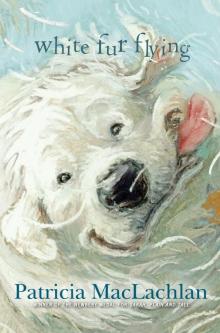 White Fur Flying
White Fur Flying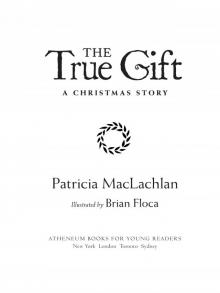 The True Gift: A Christmas Story
The True Gift: A Christmas Story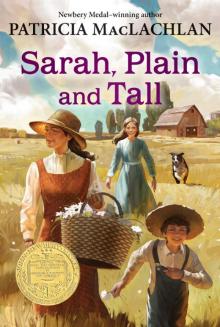 Sarah, Plain and Tall
Sarah, Plain and Tall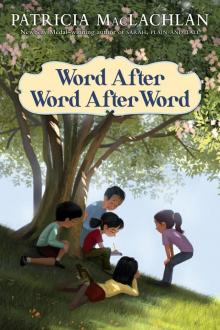 Word After Word After Word
Word After Word After Word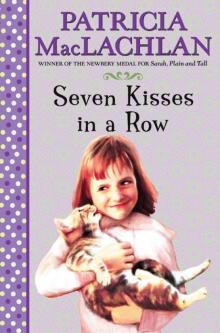 Seven Kisses in a Row
Seven Kisses in a Row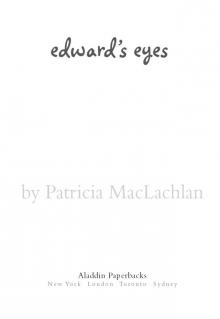 Edward's Eyes
Edward's Eyes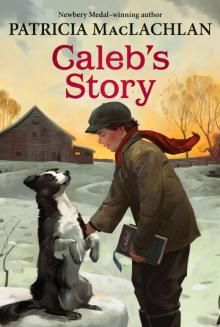 Caleb's Story
Caleb's Story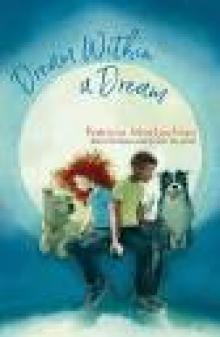 Dream Within a Dream
Dream Within a Dream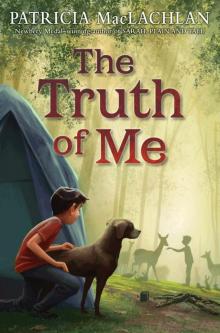 The Truth of Me
The Truth of Me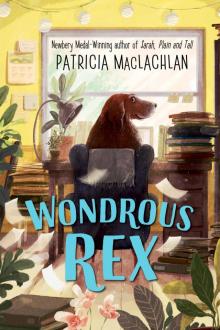 Wondrous Rex
Wondrous Rex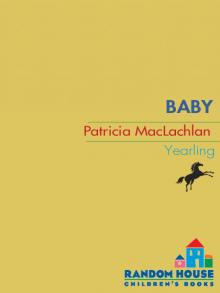 Baby
Baby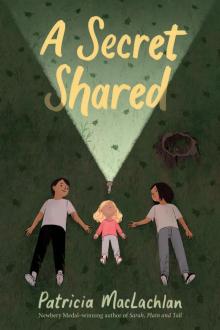 A Secret Shared
A Secret Shared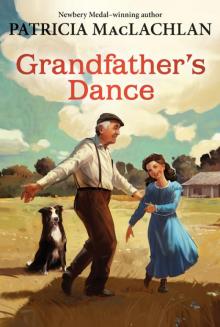 Grandfather's Dance
Grandfather's Dance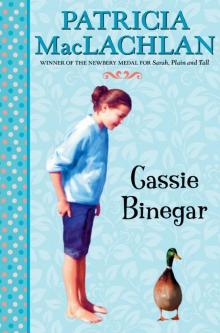 Cassie Binegar
Cassie Binegar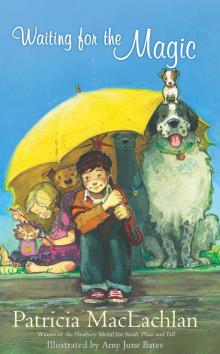 Waiting for the Magic
Waiting for the Magic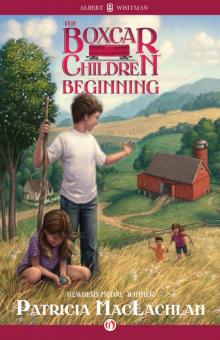 The Boxcar Children Beginning
The Boxcar Children Beginning My Father's Words
My Father's Words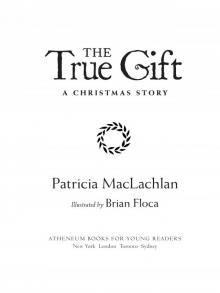 The True Gift
The True Gift